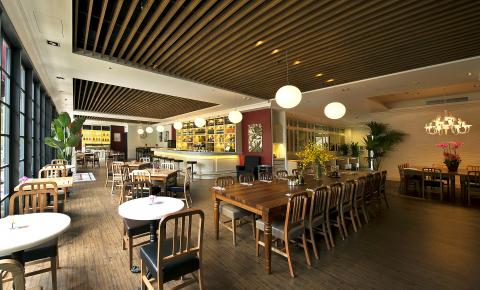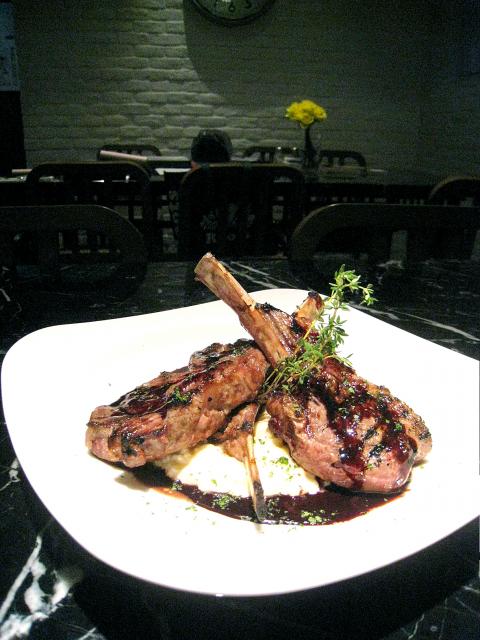Longtable, which has recently opened up in a leafy enclave hidden behind the stern office buildings along Songren Road at the eastern fringe of the Xinyi cinema and shopping district, provides something that is in very short supply in Taipei’s cost-conscious restaurant environment, namely a big, comfortable and airy space to eat and chat.
Walking through the door, this spaciousness is the first thing you notice, quickly followed by the warm tones imparted by an interior decorated mostly in natural wood tones. The high ceiling and the long bar are inviting, though on a fine day, the patio seating, looking onto a paved courtyard overhung with trees, is likely to be in high demand.
The ambiance is somewhere between a fashionable cafe and a bistro. This provides a welcome alternative to the predominantly American diner establishments that dominate in this area. The menu, instead of going for burgers and steaks, offers something a little more European. While aiming for a casual dining experience, Longtable also takes some trouble over providing elegance and refinement at the same time.

Photo courtesy of Longtable
According to restaurant proprietor Serdar Gayir, the menu aims to be inclusive, drawing in food from all along the Mediterranean coast. Italian, with a bit of generic European, dominate the menu at the present time, but Gayir said that once the restaurant is on track, he will begin including more exotic choices, including food from North Africa and even his native Turkey. Currently, his home country is represented by a rice pudding (NT$220). This has a luscious creaminess of homemade comfort food with lovely presentation, but lacks a little something to make it really distinctive.
Looking through the menu, one gets the feeling that Longtable wants to make a break from the drab, predictable fast foods that are the mainstay of establishments such as TGI Fridays and Chilis, but also desperately wants to remain family-friendly and inoffensive to even the most timid eater. The fried chicken wings (NT$290), the Caesar salad (NT$360), the spaghetti Bolognese (NT$370) and the grilled sirloin steak (NT$930) are all resolutely international staples, with no clear regional affiliation, and this gives the menu a slightly jejune air.
This is no reflection of the standard of the cooking, which is above average, and a simple dish like the pan-fried salmon fillet (NT$590) was attractive and tasty. The presentation was modern, but the portion generous, and the risotto on which the salmon was served was judged to perfection. The grilled lamb chops (NT$830), also served with risotto, also came in a generous portion, three thick chops very well trimmed, but flavor-wise again playing a little bit too safe for my taste. I regretted the lack of a bit of crispy fat and found the sauce, a tasty, red wine reduction, a bit too dominant, smothering the meaty flavor of the lamb.

Photo: Ian Bartholomew, Taipei Times
Longtable offers a selection of pizzas, and the pepperoni pizza (NT$430) I tried was well topped with a very thin crust dough, which sadly had not been crisped up quite enough.
Longtable aspires to be a place where people can come together to eat and drink at leisure and its solid menu of drinks, both alcoholic and nonalcoholic, are likely to make it a popular gathering place, both for weary office workers and for families on a weekend outing. Gayir said that Longtable is also planning on providing breakfast/brunch through the week, and a comprehensive offering of coffees and teas make it a great place to visit any time of day. For the festive season, Longtable offers a five-course set menu (with coffee or tea) for NT$1,390.

Photo: Ian Bartholomew, Taipei Times

Photo: Ian Bartholomew, Taipei Times

April 14 to April 20 In March 1947, Sising Katadrepan urged the government to drop the “high mountain people” (高山族) designation for Indigenous Taiwanese and refer to them as “Taiwan people” (台灣族). He considered the term derogatory, arguing that it made them sound like animals. The Taiwan Provincial Government agreed to stop using the term, stating that Indigenous Taiwanese suffered all sorts of discrimination and oppression under the Japanese and were forced to live in the mountains as outsiders to society. Now, under the new regime, they would be seen as equals, thus they should be henceforth

Last week, the the National Immigration Agency (NIA) told the legislature that more than 10,000 naturalized Taiwanese citizens from the People’s Republic of China (PRC) risked having their citizenship revoked if they failed to provide proof that they had renounced their Chinese household registration within the next three months. Renunciation is required under the Act Governing Relations Between the People of the Taiwan Area and the Mainland Area (臺灣地區與大陸地區人民關係條例), as amended in 2004, though it was only a legal requirement after 2000. Prior to that, it had been only an administrative requirement since the Nationality Act (國籍法) was established in

With over 80 works on display, this is Louise Bourgeois’ first solo show in Taiwan. Visitors are invited to traverse her world of love and hate, vengeance and acceptance, trauma and reconciliation. Dominating the entrance, the nine-foot-tall Crouching Spider (2003) greets visitors. The creature looms behind the glass facade, symbolic protector and gatekeeper to the intimate journey ahead. Bourgeois, best known for her giant spider sculptures, is one of the most influential artist of the twentieth century. Blending vulnerability and defiance through themes of sexuality, trauma and identity, her work reshaped the landscape of contemporary art with fearless honesty. “People are influenced by

Three big changes have transformed the landscape of Taiwan’s local patronage factions: Increasing Democratic Progressive Party (DPP) involvement, rising new factions and the Chinese Nationalist Party’s (KMT) significantly weakened control. GREEN FACTIONS It is said that “south of the Zhuoshui River (濁水溪), there is no blue-green divide,” meaning that from Yunlin County south there is no difference between KMT and DPP politicians. This is not always true, but there is more than a grain of truth to it. Traditionally, DPP factions are viewed as national entities, with their primary function to secure plum positions in the party and government. This is not unusual